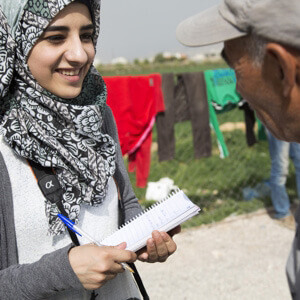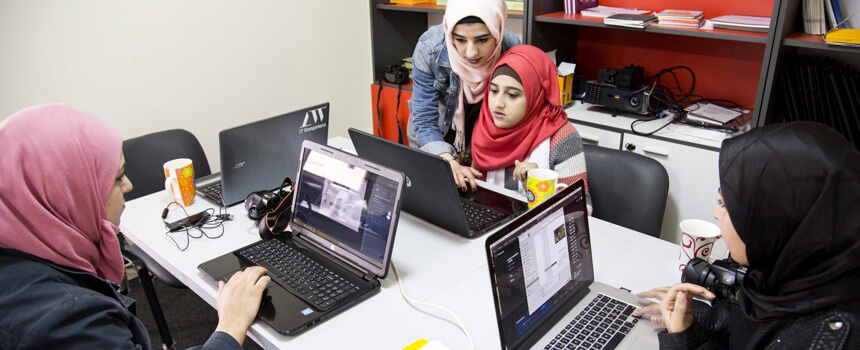 Strengthening of women’s rights
Strengthening of women’s rights
Further education for women in Lebanon
“Everything has changed for me.” Alaa props herself up on the railing of the counselling centre’s balcony with obvious confidence. “I have lost the fear that used to be part of my everyday life.” A few years ago, the mother of three had to get out of Syria with her children because of the war. After her arrival she was subjected to domestic violence. The 30-year-old received assistance in a counselling centre in Lebanon, followed by a very personal liberation: Alaa obtained a divorce. Shortly after that she participated in a course for further education, allowing her to take her fortunes into her own hand and pursue her own education and career goals. And now she is the one educating women of the region on their rights and available assistance programmes as well as winning them for further education courses for women.
Necessity
Strengthening the rights and education of (refugee) women and girls in Lebanon.
Activity
Provision and participation in a certified course of further education in business management.
Countable effort
Number of women and female young people that have participated in and obtained a diploma in a three-month course in business management.
Result
Disadvantaged women and girls in Lebanon learn important skills and knowledge to become self-sufficient in both their everyday lives and their professional situation.
Systemic effect
Women’s rights are strengthened and awareness of gender is altered positively. Women benefit from the societal and economic developments towards greater gender equality.
Background
The United Nations High Commissioner for Refugees (UNHCR) has officially registered 995,512 Syrian refugees in Lebanon in 2018. About 80.6 percent of these are women and children. However, the Lebanese government recons that there are about 1.5 million Syrian refugees (LCRP, 2018). These are spread out over 1,700 places all over the country. They live under very cramped conditions and in mostly improvised housing. Female-led households in particular are faced by a variety of challenges. Compared to male-led households, these generally have less food, are more often unemployed and thus more reliant on humanitarian aid. Furthermore, many refugee and Lebanese women are subjected to domestic violence or sexual assault. This most affects single mothers, singles or girls of ‘marriageable’ age. Because they are afraid of being isolated, many of those affected do not dare to speak out about what they have been through. Also, there are still not enough places of contact or shelters in the region.
The good deed
The good deed is providing an education course for women on business management. The course will be offered to the women free of charge and will take place at the counselling centre in the city of Chtoura. The diploma is accepted both in Lebanon and in Syria. Further, the women have access to psychologic and social counselling, legal advice as well as other information events at the counselling centre. Thanks to the various services at the counselling centre as well as the education courses, the women get the opportunity for capacity building and are empowered to become self-sufficient in the long run, gain economic independence and live a self-determined life.

About|Lebanon
Beirut
6 229 794
13.378
80
In Lebanon, the proportion of refugees is as high as nowhere else in the world. Approximately one in four people in the country has a refugee background.
About the organization and further information
AMICA e.V.
Website
Further information and source
- LCRP, 2018. Lebanon Crisis Response Plan 2017-2020 (2018 update). Government of Lebanon and UN. (Jan. 2018)
- VASYR, 2017. Vulnerability Assessment of Syrian Refugees in Lebanon. WFP, UNICEF, UNHCR (Dez. 2017)
- 3RPSyria, 2017. 3RP Regional Strategic Overview 2017-2018.
- Bundeszentrale für politische Bildung, 2018. Libanon Informationen.
- UNHCR, 2018. Lebanon. Global Focus.
- LCRP, 2018. Lebanon Crisis Response Plan 2017-2020 (2018 update). Government of Lebanon and UN. (Jan. 2018)
- VASYR, 2017. Vulnerability Assessment of Syrian Refugees in Lebanon. WFP, UNICEF, UNHCR (Dez. 2017)
- 3RPSyria, 2017. 3RP Regional Strategic Overview 2017-2018.
- Bundeszentrale für politische Bildung, 2018. Libanon Informationen.
- UNHCR, 2018. Lebanon. Global Focus.




